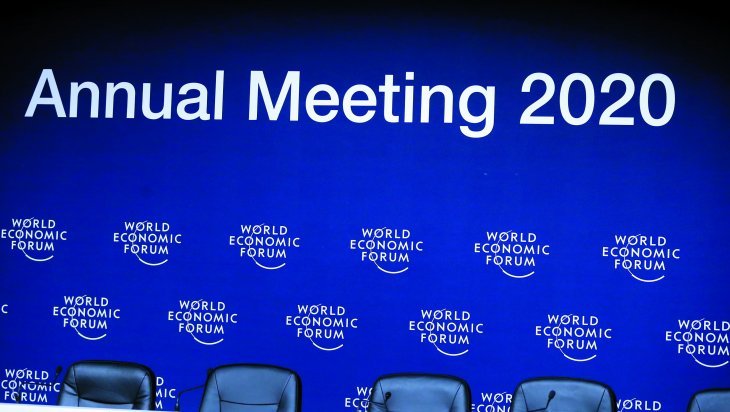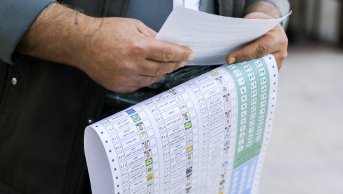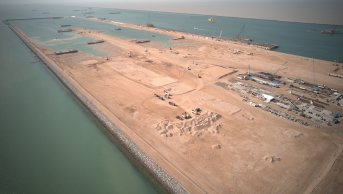Assessment of Iraqi Diplomacy in Davos

The 50th World Economic Forum, the first of which took place in 1971, was held on 21-24 January 2020 in Davos, Switzerland. With the Forum gathering, negotiations continue on various issues through informal talks between leaders. Willing to take part in these meetings, Iraqi President Barham Salih and KRG President Nechirvan Barzani went to Switzerland to join the forum. On the other hand, Iraqi Finance Minister Fuad Hussein, KRG Counter Terrorism Unit Director Lahur Talabany and Head of the KRG Department of Foreign Relations Safeen Dizayee attended the forum as well. At this point, the weight of Kurdish representatives in the Iraqi delegation participating in the Davos Forum is quite obvious.
Iraqi President Salih and KRG President Barzani met with US President Donald Trump in line with their meetings in Switzerland. Barzani also met with the Foreign Minister of the Republic of Turkey, Mevlüt Cavusoglu. At this point, the weight of Iraqi representatives meeting with US President Trump is remarkable. For, according to a statement by the White House, Trump held five bilateral meetings in Davos and two of these meetings were with Iraqi politicians. After the announcement that President Salih would meet with Trump, Abu Ali al-Military, one of the leading leaders of Kata’ib Hezbollah within the Hashd al-Shaabi, announced that the former’s meeting with his U.S. counterpart would not be welcomed and he might be expelled from the country by the public. What is more, the Asa'ib Ahl al-Haq leader, Qais al-Khazali, evaluated Barham Salih's attitude as “treacherous”.
Iraqi President Barham Salih’s Talks
Despite this threat, however, Salih held a bilateral meeting with Trump. The meeting came after the US airstrikes on January 3, 2020, which caused the killing of former Commander of the Quds Force affiliated to the Iranian Revolutionary Guards, Qasem Soleimani, and former Deputy Head of Hashd al-Shaabi, Abu Mahdi al-Muhendis (Ibrahim Jafar), and the resolution dated January 5 by the Iraqi Parliament to expel US troops. The initial results of the first bilateral meeting opposed the expectations of the Hashd al-Shaabi. In the statement made by the White House after the meeting, it was stated that the two countries will continue to work together to continue the cooperation in the economic and security fields and to conclude the efforts made against ISIS. On the other hand, it was reported that Trump's demands for a sovereign, stable and prosperous Iraq, continued. Despite this, Trump announced that sanctions against Iraq continue to be on the table, and the US military presence in Iraq has recently decreased to the lowest level after 2003, being 5 thousand. However, Trump avoided a clear attitude about the future of the US military presence in the country, saying no matter how much the US troops would withdraw, we would still hear such a complaint. However, upon the discussion of possible withdrawal scenarios following Trump's announcement, US Secretary of State Spokesperson Morgan Ortagus let it be known that the US military does not plan to withdraw from Iraq.
On the other hand, President Salih stated in his speech on January 22 that developments in the region and threats in front of Iraq damaged the peace and security of the region. In addition, talking about the ongoing demonstrations in Iraq, President Salih argued the demonstrators wanted a more inclusive state and change. Besides, about Iraq’s foreign policy, he said, “Our diplomatic and economic policies should be adopted in the direction of our national interests, not in the interests of others, including our allies. Iraq's sovereignty and stability are to the benefits of Iraq's neighbors and other countries.” In his speech he delivered in Davos, President Salih stated that Iraq was affected by regional tensions, and asked for no pressure on Iraq to be a party in conflicts for the sake of Iraq's stability.
During this period in which Iraq has been experiencing a political crisis, Salih wants the country to be kept away from tensions. Iraq’s being a party to these tensions leads to a lack of a solution in the process when political polarization increases.
KRG President Nechirvan Barzani’s Talks
Being the second politician to meet with the US President, KRG President Nechirvan Barzani attracted attention due to Trump’s confusion about the areas controlled by the terrorist organization PKK and KRG in the north of Syria. Trump thanked Barzani for the solution to the problem in Syria at the part of the meeting that was open to the press and said that ISIS was defeated and the territory under ISIS was completely cleared. Barzani added that the success against ISIS was achieved as a result of the collaboration between the parties. After the meeting, Barzani stated that the meeting was friendly and constructive although no explanation was made regarding the bilateral meeting.
Apart from US President Trump, Barzani had a meeting with Turkish Foreign Minister Mevlut Cavusoglu as well. In the statement made after the meeting, which was closed to the press, Minister Cavusoglu emphasized that Iraq carries the risk of separation because of ethnic and sectarian lines and said that Turkey’s relations with the KRG will continue to be improved. According to the statement made by the KRG Presidency, during the meeting, in which the process and regional developments which Iraq has been going through were evaluated, the cooperation opportunities were discussed to increase regional stability and prosperity. In the part of the meeting, which is closed to the press, the parties may have talked about the common steps that could be taken against the terrorist organization PKK’s presence in KRG and Iraq. For, Minister Cavusoglu attended the oath-taking ceremony held on June 10, 2019, for Nechirvan Barzani to start his position as KRG President and drew attention to the presence of the PKK in the region. Therefore, cooperation in the security field may be said to constitute one of the most important agenda items that may affect the future of Turkey-KRG relations. After meeting with Minister Cavusoglu, Barzani asked UN Secretary-General António Guterres and Swedish Foreign Minister Ann Linde to ask for more support for internally displaced persons and asylum seekers in the post-ISIS period.
On the other hand, KRG President Barzani started his speech at the panel titled “Restless Middle East” by saying that the Iraqi Parliament approved a draft bill requiring the government to ask Washington to withdraw American troops from the country in a session which the Sunnis and Kurds boycotted. On the other hand, Barzani stated that the US military presence had a large share in the operations against ISIS and that he wanted the US military presence to remain in the country. In addition, Barzani held that there was a need for the support of the international community, especially the US, for the continuation of the fight against terrorism and therefore, he was personally in favor of the foreign military forces to stay in Iraq.
In the meantime, making evaluations about the ongoing demonstrations in Iraq since October 1, 2019, Barzani said that there were young people who did not see the Baath regime as the leading actor of the demonstrations. Stating that Iraq will be different from what it had been before October 1 due to the demonstrations, Barzani said that the lack of a unified national identity lies at the root of the problems. However, he stated that the success of structures such as Switzerland and the EU, despite their various cultures and languages, should be taken as an example for Iraq.
Iraqi Deputy Prime Minister and Minister of Finance Fuad Hussein’s Talks
Iraqi Prime Minister Adil Abdul-Mahdi is performing his duty as the interim prime minister upon acceptance of his resignation by the Iraqi Parliament on 1 December 2019. Therefore, instead of Abdul-Mahdi, Deputy Prime Minister of Iraq and the Minister of Finance Fuad Hussein attended the forum. For, although the vote of confidence was abolished for Prime Minister Abdul-Mahdi by the Parliament, it is still valid for the members of the cabinet. Deputy Prime Minister Hussein also served as a speaker in the panel titled “Restless Middle East”. In his speech, Hussein talked about Iraqi politics and complained about the damage caused by regional tensions to Iraq and emphasized that a stable, sovereign and independent Iraq is in the interests of the region.
On the other hand, Hussein evaluated the recommendation of the Iraqi Parliament for the removal of foreign powers from the country and stated that a dialogue should be established with the countries in the Coalition against ISIS and it would be important to find a common solution. Following the issue of the presence of foreign powers in Iraq, Hussein said that Iraq, on the one hand, has historical relations with the US in the direction of the regional equation, and, on the other hand, good relations with its neighbor Iran. Indeed, the speech of the Deputy Prime Minister is important in terms of expressing that Iraq does not want to be a party to the tensions.
In Iraq, where anti-government protests continue and the reflections of the tension between the US and Iran are experienced in concrete terms, the Central Government strives to receive support and reinforce its legitimacy by meeting with international actors. The Central Government shows that it has prioritized independence in its foreign policy, remaining neutral in the tension between the US and Iran. However, there are requests from the US and Iran for Iraq to cut ties with the other actor. In response to these demands, the Central Government has a balance policy and emphasizes the importance of both countries for Iraq. As a matter of fact, the support given by the US and Iran for the defeat of ISIS is mentioned and the significance of the two countries for the Iraqi economy is touched upon. Despite the balancing attitude of the Central Government, the KRG is attempting to get the support of the international public by taking advantage of the demonstrations in Iraq and the tension between the US and Iran. The fact that one of the five leaders US President Trump has met is Nechirvan Barzani shows that the United States could win the KRG over against Iran. Nevertheless, KRG officials seem to be afraid to face Iran directly. This reveals the importance attributed to receiving US support that had not been received in the independence referendum held by the KRG in 2017, during the process when possible dissolution scenarios regarding Iraq were discussed.








